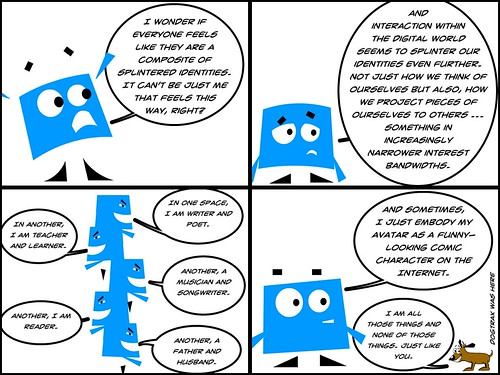I am dipping into Equity Unbound, a new online course/collaboration with Mia Zamora, Maha Bali and Catherine Cronin. They will be working with university students as well as opening things up to other spaces where folks, like you and me, can jump in. (The Twitter tag is here: #unboundeq) I am always interested in seeing how new offerings can be riffs off previous open learning networks, such as NetNarr, Rhizo, Digiwrimo, CLMOOC, and others.
One of the topics of the first week is to think about the nature of identity. I’ve done regular mulling on this topic of digital identities before and continue to be intrigued by the way we are perceived and the ways we project ourselves through networks and platforms. In my classroom with sixth graders (11 year olds), we have discussions about this in relation to creating avatars for online spaces and gaming platforms. What do your choices about your avatar say about you? About what you want others to think about you?
In some ways, we have the possibility to create new identities or to build off existing interests, to find groups with our interests (that long tail effect) and use identity to connect. In other ways, once we project ourselves into the world, we relinquish (sometimes, rather reluctantly) some authority over that identity since we lose the human interaction (facial expressions, hand movements, emotional reactions) that plays such a large role in the ways we understand another. This tension sits at the heart of the possibility and the problems of engaging in online discussions with others.
See more posts in the Identity tag here at my blog from over the years.
So, I am thinking I might do some webcomics for this Equity Unbound course as much as possible, as another way for me think about different issues. I created the comic above as I was pondering this question of how our digital interactions are often two sides of our identity — sometimes on purpose and sometimes, not.
Peace (framed),
Kevin

Kevin, your comic really resonates, particularly for someone who’s got over 200 social media related accounts and identity presences in various places on the internet.
It reminds me of a line I wrote a few months back in an article about the IndieWeb idea of Webmentions for A List Apart entitled Webmentions: Enabling Better Communication on the Internet:
Possibly worst of all, your personal identity on the internet can end up fragmented like so many horcruxes across multiple websites over which you have little, if any, control.
Inherent in this idea is that corporate interests and others who run social sites can disappear, delete, or moderate out of existence any of my writing, photos, audio, video, or other content into the memory hole at any time and for almost any reason. And just like a destroyed horcrux, their doing so takes a bit of my soul (identity) with it each time.
A few years back, I decided to take back my own identity on the web and post everything of interest to me on my own website on my own domain first–a digital commonplace book if you will. Only then do I syndicate it into other communities, websites, or areas as needed. (Even this reply is on my own site before I syndicate it to yours.) As a result, I own a tremendously large part of my online identity (though even at that, a lot of it is published privately for myself or select small audiences).
I hope that as Equity Unbound continues and we explore the ideas of identity, public/private, and related topics, people might consider some of these ideas and implications and potentially work on expanding solutions for students, teachers, and the rest of the world.
(Original reply with links appeared at https://boffosocko.com/2018/09/13/reply-to-equity-unbound-webcomic-splintered-digital-identities-kevin-hodgson/)